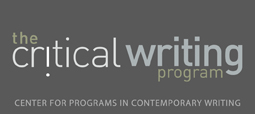Biology
An Overview of the Discipline
Biology is the study of living organisms and how they function. Biologists adhere to the scientific method of making observations, creating a hypothesis based on observations, designing an experiment that will test this hypothesis, and analyzing the results to draw conclusions. Subdisciplines in biology include:
- Molecular biology
- Neurobiology
- Ecology and evolutionary biology
- Computational and mathematical biology
Writing in the Discipline
Goals
Writing in the field of biology is purposeful. Grant proposals are written in order to persuade others to provide funding. Papers are published in order to share findings. Biologists write reviews of colleagues' manuscripts to ensure that the research and analysis published in professional journals is valid and substantial. Most often the written work of biologists is motivated by problem definition and solution, but some writing may be devoted to argument and debate. An example of this is debate about nomenclature.
Reasoning
Biology is an explanatory discipline, including explaining how an experiment was conducted and how the data collected establishes or fails to establish a hypothesis. The data must be accurately described, and the reasoning needs to be scientifically sound. Persuasion enters into the writing of biologists in terms of what data they select, how they choose to describe it and, most clearly, in the sections where the biologists must convince colleagues of the importance and implications of their results.
Evidence
Good evidence is repeatable, relevant to the experiment, and unique from previous experiments. Biologists employ quantitative measurements as well as qualitative observations as evidence. Different subfields may regard different kinds of evidence as legitimate. For example, ecologists may take many data points and use statistical methods to analyze the numbers, while a microbiologist may work with mutant organisms and use the phenotypes as evidence. Evidence is also important for grant proposals. Without strong data, biologists will encounter difficulty in obtaining funding or publishing in well-known journals.
AUTHORSHIP
Co-authorship is common in papers that present the findings of an experiment conducted by a group. Scholarly articles, on the other hand, are more commonly authored individually. Scientists must keep up to date on current research so that they can collaborate and build upon what is already known in the field.
Writing Tips
Organization
Typically student writing assignments follow the conventions of genres in the professional field. However, the organization of a scholarly article may differ because professional journals may have different conventions. In general, scholarly articles begin with an abstract and an introduction that describes the purpose and relevance of the experiment. Procedures and methods are provided, along with detailed results. The author finally offers conclusions from the data and future implications of the findings.
Style Preferences
Biologists prefer shorter sentences to preserve clarity. Similarly, they prefer simple verbs such as show, make, and is. Biologists need to be particularly versatile in terms of writing to particular audiences, for their articles and proposals contain sectionsthere are written to different audiences. For example, the introduction to a grant proposal needs to be written to educated nonspecialists who may make the final funding decision. Being too technical is likely to lose this audience. However, sections on methodology and data need to be written to experts, who may otherwise doubt the credibility of the writer. More importantly, others must be able to reproduce the scholar’s experiment, and this means that readers must have a clear understanding of every aspect of the text. There is no room for ambiguity.
Citation Practices
Biologists use different citation styles depending on the preferences of the journals in which they publish. The three styles most commonly used are:
- Council of Biology Editors' (CBE) Style
- Council of Science Editors' (CSE) Style
- American Psychological Association (APA) Style
Common Errors
- Using active voice rather than passive voice in situations that demand attention to the process rather than the agent of the process. For example, the methods section should focus on the actions such as "The transformed cells were identified using kanamycin” rather than “I found the transformed cells using kanamycin."
- Failing to connect the sections of a paper to unify the piece as a whole.
- Over-interpreting results. Sometimes students may fail to describe the actual results and what they may imply, instead discussing what they would like the results to show.
- Focusing too much on results and failing to draw conclusions from the results.
- Providing unnecessary details or neglecting to provide important details.
Genres
Student Assignments
At the undergraduate level, students write lab reports and grant proposals. Some upper-level classes may ask students to write a research proposal. Graduate students are more heavily involved in writing research articles, which outline experiments and prove or disprove hypotheses.
Biology professors encourage students to take classes that require writing. They encourage graduate students to take writing classes as well as have regular writing conferences with their professors.
Professional Writing
While biologists predominantly write research articles, they also write textbook chapters, review articles, and research grants. Biologists, and scientists in general, are compelled to write for a wide range of readers because their grants and papers generally need to convince people from many subfields.
The following link has a list of Penn professors, sorted by subdiscipline, with links to examples of their writing.
Biology Research Areas© 2013-2014 The University of Pennsylvania
Meet the Professors
 Dr. Paul Schmidt
Dr. Paul Schmidt
Dr. Schmidt only writes when he has a long period of time available to work. More...
 Dr. Mechthild Pohlschroder
Dr. Mechthild Pohlschroder
Dr. Pohlschroder begins with an abstract to see of anything is missing, and then... More...

Dr. Brian Gregory
Dr. Gregory's writing process involves a lengthy peer revision process. More...
